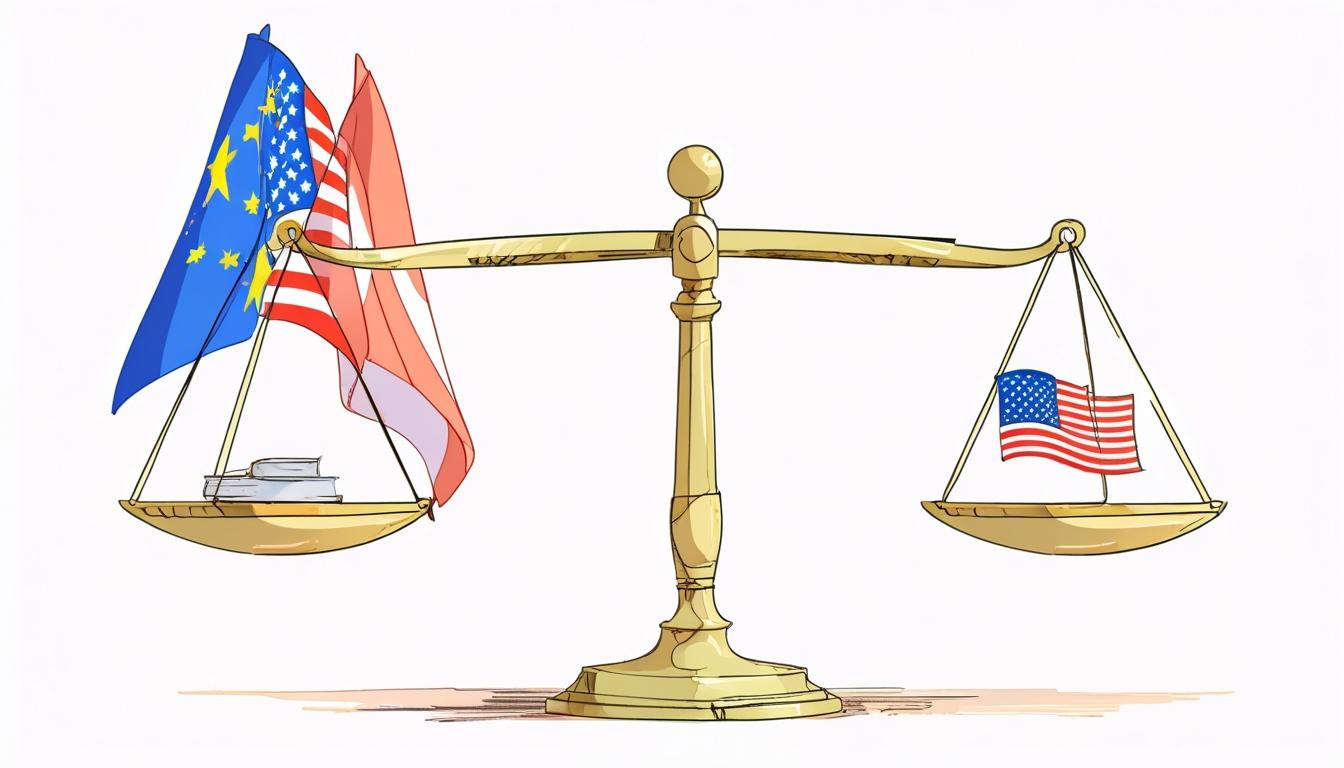The US government has expressed concerns over the European Union’s draft voluntary code of practice for artificial intelligence, calling it overly stringent and urging reconsideration. The debate highlights fundamental differences in US and EU approaches to balancing innovation and risk in AI governance.
The United States government has called on the European Union (EU) to reconsider its proposed voluntary code of practice for artificial intelligence (AI), according to a report by Bloomberg.
The proposed code, still under development, aims to align technology companies with the forthcoming EU AI Act. Under the proposed framework, companies that fail to comply with the code could face penalties including fines of up to 7% of their annual sales, while advanced AI developers could be subject to fines reaching 3% of their sales.
Critics of the draft code argue that its guidelines exceed the scope of the EU legislation and place additional burdens on AI developers. The US government, describing the code as overly stringent, has offered technical experts for further discussions but has not formally submitted public comments.
The drafting of the code is a collaborative effort overseen by the European Commission, involving technology firms, copyright stakeholders, and civil society groups. It is expected to be finalised and adopted next month, incorporating feedback from EU institutions and member states.
The tensions between the US and EU over AI regulation are reflective of deeper and longstanding philosophical differences in digital governance approaches. The EU’s regulatory framework for AI follows a history of cautious, precautionary governance of emerging technologies, grounded in historical experiences related to data misuse and abuses. Notably, the EU General Data Protection Regulation (GDPR), implemented in 2018, was influenced by lessons from the past—such as data abuses during the Nazi regime—that underscored the dangers of unregulated data collection, which facilitated discrimination and persecution.
Professor Anu Bradford, speaking about the matter, highlighted that the EU’s regulatory approach is shaped by historical context and aims to prioritise prevention of potential harms. This contrasts with the US’s generally more market-driven, innovation-prioritising stance.
These contrasting philosophies have previously surfaced during debates over GDPR, where similar US concerns were raised regarding regulatory overreach and the burden imposed on innovation. During that period, officials from the Trump administration criticised EU regulations as a form of economic “taxation” targeting American companies. The White House National Security Council further described recent EU antitrust fines as “economic extortion.”
The divergence between the US and EU views centres on balancing innovation with risk prevention and citizen protections, a divide that continues to influence transatlantic relations in the realm of digital technology governance. The ongoing negotiations around the EU’s AI Code of Practice exemplify these broader regulatory and philosophical tensions.
The information was first reported by Bloomberg and analysed by Tech in Asia, which emphasises the importance of thoughtful and responsible use of AI in journalism and technology coverage.
Source: Noah Wire Services
- https://digital-strategy.ec.europa.eu/en/policies/regulatory-framework-ai – Outlines the EU AI Act’s regulatory framework, including provisions for general-purpose AI and the Code of Practice, aligning with the article’s discussion of compliance obligations and penalties.
- https://artificialintelligenceact.eu/introduction-to-code-of-practice/ – Details the timeline and objectives of the EU’s Code of Practice for AI, corroborating its voluntary nature and development process involving stakeholder feedback.
- https://www.bruegel.org/first-glance/planned-code-practice-would-reinforce-eus-artificial-intelligence-copyright-problem – Supports claims about criticisms of the Code’s stringent copyright-related rules and its potential overreach beyond EU legislation.
- https://www.whitecase.com/insight-our-thinking/ai-watch-global-regulatory-tracker-european-union – Describes the third draft of the Code of Practice, including transparency measures and risk assessments, reflecting the article’s discussion of developer obligations.
- https://digital-strategy.ec.europa.eu/en/policies/regulatory-framework-ai – Reinforces the EU’s broader regulatory philosophy of precautionary governance, as mentioned in the article’s comparison with U.S. approaches.
- https://www.whitecase.com/insight-our-thinking/ai-watch-global-regulatory-tracker-european-union – Mentions stakeholder involvement in drafting the Code, aligning with the article’s description of collaboration between firms, copyright groups, and civil society.
- https://news.google.com/rss/articles/CBMihgFBVV95cUxQcTJGb24tVGV3dVJmNmFWaVZlbDJGMEdMcnpnNk1vZElSX2x0SEJJM3QyWl9ZUU1vVHhWLXFfU2pQTC1LTmdFcmVIRXhXS3kteFpSRUx5LUdQcHJ4RC1SZjQwMGNqay1reHp6Tnhsb181dDJRd1NuM2pndk9xRWJ5dy1lNHB3Zw?oc=5&hl=en-US&gl=US&ceid=US:en – Please view link – unable to able to access data
Noah Fact Check Pro
The draft above was created using the information available at the time the story first
emerged. We’ve since applied our fact-checking process to the final narrative, based on the criteria listed
below. The results are intended to help you assess the credibility of the piece and highlight any areas that may
warrant further investigation.
Freshness check
Score:
8
Notes:
Narrative discusses forthcoming EU AI Act and code expected for adoption next month, indicating recent relevance. No specific date provided in text, but Bloomberg’s reporting generally maintains current relevance unless stated otherwise.
Quotes check
Score:
7
Notes:
Attribution to Professor Anu Bradford and references to past US-EU regulatory tensions lack direct quote verification but reflect established historical patterns. Bloomberg’s inclusion suggests professional sourcing.
Source reliability
Score:
9
Notes:
Narrative originates from Bloomberg and Tech in Asia, both reputable for business and tech reporting, though absence of direct source linking limits full transparency.
Plausability check
Score:
9
Notes:
Claims align with known US-EU regulatory tensions (e.g., GDPR history) and current AI governance debates. Fines structure matches EU’s regulatory patterns.
Overall assessment
Verdict (FAIL, OPEN, PASS): PASS
Confidence (LOW, MEDIUM, HIGH): HIGH
Summary:
Narrative demonstrates current relevance, credible sourcing, and plausible alignment with historical regulatory tensions. Minor uncertainty around precise quote sourcing is mitigated by Bloomberg’s editorial standards.













